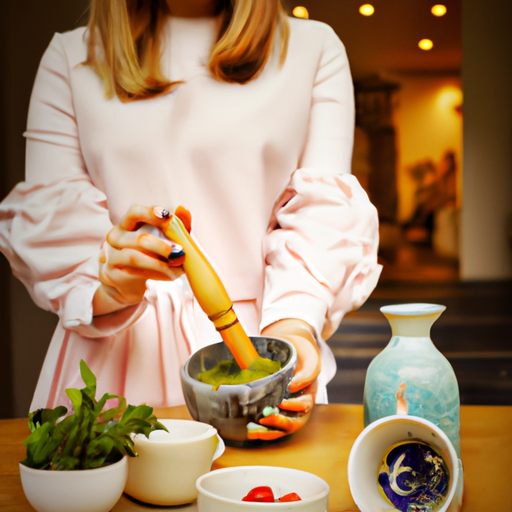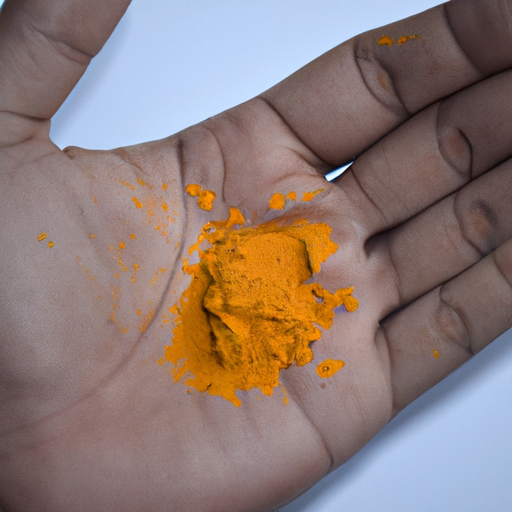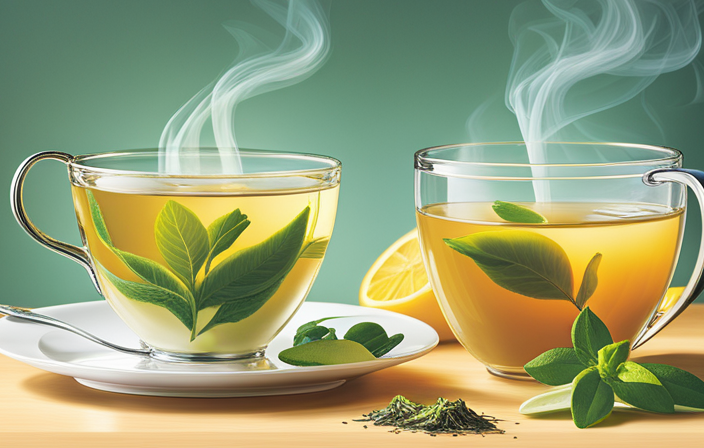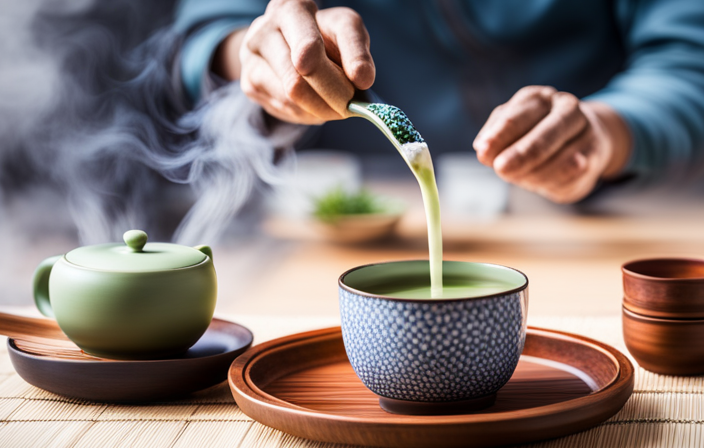African Tea
Turmeric Tea Or Supplements?

Were you aware that turmeric has been utilized in Ayurvedic medicine for more than 4,000 years to address various health issues? This vibrant yellow spice, commonly referred to as Indian saffron, has become increasingly popular in recent times due to its multitude of health advantages.
One of the most popular ways to consume turmeric is through supplements, but there’s also a delicious and easy way to get your daily dose: turmeric tea.
As a nutrition expert, I’m often asked about the best ways to incorporate turmeric into a healthy diet. While supplements can be convenient, there are some potential downsides to taking them. On the other hand, turmeric tea is a tasty and natural way to reap the benefits of this powerful spice.
In this article, we’ll explore the pros and cons of both turmeric tea and supplements, and I’ll provide tips on how to choose the right supplement and how to combine the two for maximum benefit.
Key Takeaways
- Turmeric tea and supplements both provide health benefits, but the choice ultimately depends on personal preference and individual health needs.
- When choosing turmeric supplements, it is important to consider factors such as quality, purity, and brand reputation to ensure optimal health benefits and safety.
- Turmeric can be incorporated into diets through food and cooking, and consuming it with black pepper or a source of fat can improve absorption.
- Pregnant or breastfeeding individuals should consult with a healthcare provider before using turmeric, and regular check-ins with healthcare professionals can help monitor changes in health and ensure safety and effectiveness of turmeric use.
Understanding the Benefits of Turmeric
Turmeric isn’t just a spice, it’s a powerful anti-inflammatory and antioxidant that can improve brain function and lower the risk of heart disease. In fact, turmeric has been used for thousands of years in traditional medicine for its numerous health benefits.
The active ingredient in turmeric, curcumin, has been studied extensively for its ability to reduce inflammation, which is linked to many chronic diseases such as cancer, Alzheimer’s, and arthritis.
One way to reap the benefits of turmeric is through curcumin supplements. These supplements are available in capsules, powders, and extracts. However, it’s important to choose high-quality supplements that are standardized to contain a certain amount of curcumin.
It’s also important to note that curcumin supplements may interact with certain medications, so it’s best to consult with a healthcare professional before taking them.
Turmeric Tea: How to Make It
I absolutely love making turmeric tea at home because it’s both easy and delicious.
To make it, I start by boiling turmeric root for about 15 minutes. Then, I like to add other ingredients such as ginger, honey, and lemon to enhance the flavor and add even more health benefits.
Finally, I strain the tea and enjoy it either hot or cold, depending on my mood.
Boiling Turmeric Root
After bringing a pot of water to a boil, I add chopped turmeric root and let it simmer for 10-15 minutes to infuse the water with its beneficial properties. As someone who’s knowledgeable about the health benefits of different foods and supplements, I know that turmeric root has been used for centuries for its anti-inflammatory and antioxidant properties. Boiling the root is a great way to extract its beneficial compounds and incorporate them into your diet.
Here are some alternative uses for boiling turmeric root:
-
Add ginger and honey for a soothing tea that can help with cold and flu symptoms
-
Mix with coconut milk and black pepper for a golden milk latte that can aid in digestion and promote relaxation
-
Add cinnamon, cardamom, and cloves for a chai-like tea that can improve blood sugar control
-
Use the boiled turmeric water as a base for a soup or stew for added flavor and health benefits
-
Freeze the turmeric water into ice cubes and use in smoothies or other drinks for a boost of antioxidants and anti-inflammatory compounds
Now, let’s move on to adding other ingredients to enhance the flavor and nutritional value of your turmeric tea.
Adding Other Ingredients
As you explore the vast world of flavor and nutrition, your taste buds will be delighted by the endless possibilities of ingredients that can be added to your boiling pot. When it comes to turning your turmeric root into tea, adding other ingredients can enhance both the taste and the health benefits of your beverage.
One popular addition is honey, which not only adds a touch of sweetness but also has its own anti-inflammatory properties. However, it’s important to be aware that some people may have potential allergies to certain ingredients. For example, if you have a pollen allergy, consuming honey may cause an allergic reaction. Additionally, some individuals may have a sensitivity to turmeric itself, which could cause digestive discomfort. Always consult with a healthcare professional before adding new supplements or ingredients to your diet.
Transitioning into the subsequent section about how to serve and enjoy, it’s important to note that there are many ways to enjoy your turmeric tea or supplement. From adding it to smoothies to using it as a base for a warming latte, the possibilities are endless. The key is to find a way that you enjoy and that fits into your daily routine to reap the maximum benefits of this powerful ingredient.
How to Serve and Enjoy
Transforming my kitchen into a cozy cafe, I love serving turmeric tea with a twist. Adding a dash of cinnamon and frothy almond milk to my golden-hued brew creates a delicious latte-like experience.
Here are some serving suggestions and flavor variations you can try:
- Add honey or maple syrup for sweetness.
- Use coconut milk or cream for a creamier texture.
- Try adding a pinch of black pepper to enhance turmeric’s absorption.
- Garnish with fresh mint or a slice of lemon for a refreshing flavor.
Turmeric tea is a versatile drink that can be enjoyed in many ways. While I prefer it as a latte, it can also be served over ice for a refreshing summer drink.
In the next section, we’ll discuss the pros and cons of consuming turmeric tea versus taking supplements.
Turmeric Tea: Pros and Cons
Turmeric tea is a flavorful and natural way to reap the benefits of this powerful spice without resorting to supplements. Not only is it easy to make, but there are also various turmeric tea brewing techniques and flavor variations to suit everyone’s taste buds. To help you decide whether turmeric tea is right for you, here are some pros and cons to consider.
| Pros | Cons | Neutral |
|---|---|---|
| Contains Curcumin, a powerful anti-inflammatory compound | May cause stomach upset in large amounts | Taste may not be to everyone’s liking |
| Can improve brain function and reduce the risk of heart disease | May interfere with certain medications | May not provide as high of a dose of curcumin as supplements |
| Can aid in digestion and boost the immune system | May not be as effective as supplements for certain conditions | May be difficult to find fresh turmeric root for brewing |
While turmeric tea has its pros and cons, it’s important to remember that it’s just one way to incorporate turmeric into your diet. In the next section, we’ll explore turmeric supplements and what they have to offer.
Turmeric Supplements: What Are They?
If you’re looking for another way to incorporate the health benefits of this powerful spice into your routine, you might want to consider trying out some turmeric capsules or pills.
These supplements contain concentrated amounts of curcumin, the active compound in turmeric that has been shown to have anti-inflammatory and antioxidant properties.
However, it’s important to note that the dosage recommendations for turmeric supplements can vary greatly depending on the brand and concentration of curcumin.
Additionally, it’s important to consult with a healthcare provider before starting any new supplement regimen, as turmeric supplements may have potential interactions with medications such as blood thinners or diabetes medications.
It’s always best to err on the side of caution and speak with a professional before adding any new supplements to your routine.
With that said, let’s dive into the pros and cons of turmeric supplements in the next section.
Turmeric Supplements: Pros and Cons
After learning about what turmeric supplements are, let’s now delve into the pros and cons of taking them.
On the positive side, turmeric supplements provide a convenient and standardized way to consume curcumin, the active ingredient in turmeric that’s been linked to numerous health benefits. These supplements also come in various forms, such as capsules, tablets, and powders, making it easy to incorporate into one’s daily routine.
However, there are also potential downsides to taking turmeric supplements. One of these is the risk of taking too much, which can lead to side effects such as upset stomach, diarrhea, and nausea. It’s crucial to follow the recommended turmeric supplement dosage and consult a healthcare professional before taking them, especially if you have an underlying medical condition or are taking other medications.
Additionally, some turmeric supplement interactions may occur, particularly with blood-thinning medications, so it’s essential to be aware of these and talk to your doctor before starting a turmeric supplement regimen.
As we’ve seen, turmeric supplements have their advantages and disadvantages. Now, let’s move on to the next section where we’ll discuss how to choose the right turmeric supplement for your needs.
Choosing the Right Turmeric Supplement
When it comes to choosing the right turmeric supplement, there are a few key things to consider.
First and foremost, quality and purity are essential. Look for supplements that are third-party tested and certified for purity.
Second, brand reputation matters. Do your research and choose a reputable brand with a strong track record of producing high-quality supplements.
Finally, consider price and value. While you don’t necessarily want to skimp on quality, you also don’t want to overpay for a supplement that’s not worth the price.
Quality and Purity
For optimal health benefits, it’s important to choose turmeric supplements or tea that are of high quality and purity. Turmeric purity is an important factor to consider when selecting a product. Look for products that follow strict sourcing standards and have been tested for contaminants such as heavy metals and pesticides.
It’s also important to choose products that contain high levels of curcumin, the active ingredient in turmeric that’s responsible for its health benefits. When selecting a turmeric supplement or tea, don’t just focus on the product itself, but also on the brand reputation.
Look for brands that are known for producing high-quality products and have a good reputation within the health and wellness community. This will ensure that you’re choosing a product that’s not only pure and high-quality, but also backed by a reputable company that stands behind its products.
By taking these steps, you can ensure that you’re getting the most out of your turmeric supplement or tea and reaping all of its potential health benefits.
Brand Reputation
Optimal health benefits from a product aren’t only dependent on the quality and purity, but also on the brand reputation.
When it comes to turmeric tea or supplements, it’s important to choose a reputable brand that has a track record of producing high-quality products. A brand’s reputation can be determined by looking at their history, their commitment to quality, and their customer reviews.
When choosing a brand, it’s important to consider the experiences of other consumers. Reading consumer reviews can provide valuable insight into the quality of a brand’s products and their customer service. A brand with a strong reputation and positive reviews is more likely to deliver the health benefits that you’re looking for.
With so many options on the market, it can be overwhelming to choose the right brand, but doing your research and choosing a reputable brand is crucial for optimal health benefits.
Moving on to the next section about ‘price and value’, it’s important to note that while cost is a factor to consider, it shouldn’t be the only determining factor in your decision-making process.
Price and Value
After discussing the importance of brand reputation when choosing turmeric products, let’s dive into another important factor to consider – pricing and value. Turmeric pricing strategies can vary depending on the form of the product, the brand, and the retailer. Turmeric supplements can range anywhere from $10 to $50 per bottle, while turmeric tea bags can range from $4 to $15 per box. It is important to compare prices and value before making a purchase.
To make the comparison easier, let’s look at a table that compares the pricing and value of turmeric supplements with other popular supplements. This table takes into account the price per bottle, the number of servings per bottle, the amount of turmeric per serving, and the price per gram of turmeric.
| Supplement | Price per Bottle | Servings per Bottle | Turmeric per Serving | Price per Gram of Turmeric |
|---|---|---|---|---|
| Turmeric Supplement A | $20 | 60 | 500mg | $0.11 |
| Turmeric Supplement B | $30 | 90 | 1000mg | $0.11 |
| Turmeric Supplement C | $40 | 120 | 1500mg | $0.09 |
| Omega-3 Supplement | $25 | 60 | 1000mg | $0.04 |
| Multivitamin | $20 | 60 | N/A | N/A |
As we can see from the table, turmeric supplements can vary greatly in price and value. It is important to consider the amount of turmeric per serving and the price per gram of turmeric when comparing different supplements. Additionally, it is important to compare the pricing and value of turmeric supplements with other popular supplements to make an informed decision.
When it comes to incorporating turmeric into your diet, it is important to consider both turmeric tea and supplements. But how can we combine these two forms of turmeric? Let’s explore in the next section.
Combining Turmeric Tea and Supplements
I believe that combining turmeric tea and supplements can maximize health benefits. Turmeric is known to have anti-inflammatory and antioxidant properties, and taking it in both forms can boost its effectiveness.
However, it’s important to be aware of potential risks or side effects, such as interactions with certain medications or digestive issues. As an expert in food and nutrition, I suggest consulting with a healthcare provider before adding turmeric supplements to your routine.
Maximizing Health Benefits
To get the most out of turmeric, you’ll want to incorporate it into your daily routine in a way that works for you, whether that’s sipping on a warm cup of turmeric tea or taking a daily supplement. When it comes to dosage and timing, it’s important to consult with a healthcare professional to determine the appropriate amount for your specific needs.
Additionally, turmeric has been found to have potential benefits for a variety of health conditions, including reducing inflammation and improving brain function. In order to maximize the health benefits of turmeric, it’s important to consider how it’s being consumed. Some studies suggest that consuming turmeric with black pepper can increase its absorption in the body, while others indicate that taking it with a source of fat can also improve its absorption.
It’s important to note that while turmeric has potential health benefits, it may not be appropriate for everyone and may interact with certain medications. In the next section, we’ll explore potential risks or side effects associated with turmeric consumption.
Potential Risks or Side Effects
With the previous subtopic, we were able to uncover ways to maximize the health benefits of turmeric tea or supplements. However, it’s also important to consider the potential risks or side effects that come with its consumption.
While turmeric is generally safe to consume, taking it in large amounts may cause gastrointestinal problems such as bloating, nausea, and diarrhea. It may also interfere with blood sugar levels and blood clotting, which can be harmful to those who are taking medication or have underlying medical conditions.
Therefore, it’s crucial to follow the recommended dosage and timing when taking turmeric supplements or drinking turmeric tea. It’s best to consult with a healthcare professional before incorporating it into your diet to weigh the risks vs benefits and determine if it’s safe for you to consume.
Moving forward, it’s important to take precautions and considerations when consuming turmeric tea or supplements. Let’s dive deeper into the potential interactions and effects it may have on certain individuals.
Precautions and Considerations
Before trying turmeric supplements or drinking turmeric tea, it’s important to be aware of the precautions and considerations to ensure it’s safe for you.
Firstly, if you have a known turmeric allergy, it’s best to avoid consuming turmeric in any form.
Secondly, it’s crucial to follow the dosage recommendations provided by your healthcare provider or the supplement manufacturer. Taking too much turmeric can lead to gastrointestinal discomfort and may interfere with certain medications.
Lastly, if you’re pregnant or breastfeeding, it’s recommended to consult with your healthcare provider before consuming turmeric supplements or drinking turmeric tea.
It’s essential to take these precautions and considerations seriously to avoid any potential risks or side effects. However, if turmeric is safe for you to consume, there are other ways to incorporate it into your diet besides drinking tea or taking supplements.
Other Ways to Incorporate Turmeric
When it comes to incorporating turmeric into our diets, there are various options beyond just drinking tea or taking supplements. As someone who’s knowledgeable about the health benefits of different foods and supplements, I recommend considering a few key points before deciding on the best way to incorporate turmeric.
These points include reviewing the pros and cons of different methods, taking personal preferences and health needs into account, and consulting with a healthcare professional for individualized advice.
Review of Pros and Cons
Sure, turmeric supplements might seem like a tempting shortcut to reaping the health benefits, but let’s not forget the potential drawbacks, such as the risk of interactions with other medications.
Additionally, supplements may not have the same level of efficacy as turmeric tea, which has been used for centuries in traditional medicine to treat various ailments. While there is limited research on the comparison of turmeric tea vs. supplements, consumer experiences suggest that turmeric tea may be more effective in providing relief from inflammation and promoting overall health.
To further weigh the pros and cons, it’s important to consider the potential side effects of turmeric supplements, such as digestive issues and allergic reactions. On the other hand, turmeric tea is generally considered safe to consume and can even be beneficial for digestive health.
However, the downside of drinking turmeric tea is that it may not provide the same level of concentration of curcumin, the compound responsible for turmeric’s health benefits, as supplements. Ultimately, the decision between turmeric tea and supplements depends on personal preferences and health needs.
Would you prefer a warm cup of turmeric tea or a convenient turmeric supplement? Let’s explore the factors to consider in the next section about personal preferences and health needs.
Personal Preferences and Health Needs
As someone who’s always been interested in natural remedies for health and wellness, I’ve tried both turmeric tea and supplements to see which works best for me. While both have their pros and cons, my personal preference leans towards using turmeric in cooking and skincare.
When it comes to cooking, turmeric is a versatile spice that can be used in a variety of dishes, from curries to smoothies. Not only does it add a unique flavor, but it also has potential health benefits such as reducing inflammation and improving digestion.
In terms of skincare, turmeric has been used for centuries in traditional Ayurvedic practices to improve skin complexion and reduce acne. I’ve found that using turmeric as a face mask or mixing it with honey as a spot treatment has helped improve the overall appearance of my skin.
While I’ve found success in incorporating turmeric into my daily routine, it’s important to note that everyone’s health needs are different. Before making any significant changes to your diet or skincare routine, it’s crucial to consult with a healthcare professional to ensure it’s safe and beneficial for your individual needs.
Consultation with a Healthcare Professional
Before making any changes to your health and wellness routine, it’s important for you to consult with a healthcare professional to ensure that it’s safe and effective for you.
This is especially important when considering incorporating turmeric tea or supplements into your daily routine. While turmeric has been shown to have numerous health benefits, it’s important to keep in mind that it may not be suitable for everyone.
When consulting with your healthcare professional, it’s important to be honest about your health needs and any medications or supplements you may be taking. This will allow them to make an informed decision about whether or not turmeric is appropriate for you.
Additionally, regular check-ins with your healthcare professional can help you monitor any changes in your health and ensure that turmeric is still a safe and effective addition to your routine.
Remember, taking care of your health is a team effort, and working with a healthcare professional can help you achieve your wellness goals safely and effectively.
Frequently Asked Questions
Can turmeric tea or supplements be harmful in any way?
In general, turmeric has many health benefits. However, excessive intake of turmeric supplements can cause digestive issues and negatively interact with certain medications. It’s important to follow recommended turmeric supplement dosage and consult with a healthcare professional.
How much turmeric should be consumed daily to reap its benefits?
To reap the health benefits of turmeric, a dosage of 500-2,000 mg of curcumin per day is recommended. Use turmeric in recipes or as a supplement, but consult a healthcare practitioner for specific needs.
Are there any side effects associated with consuming turmeric in tea or supplement form?
It’s important to note that consuming too much turmeric in any form can lead to digestive issues. However, when consumed in moderation, turmeric tea benefits digestion and reduces inflammation, while turmeric supplements effectiveness depends on the quality and dosage.
Are turmeric supplements regulated by any governing body?
Regulatory standards for turmeric supplements vary depending on the country. In the US, the FDA does not regulate supplements like drugs, but manufacturers must adhere to certain quality control and manufacturing processes. Ingredient sourcing is also important for ensuring purity and potency.
Can turmeric interact with any medications or medical conditions?
It’s important to talk to a healthcare provider before taking turmeric supplements or consuming turmeric tea if you’re on any medications or have medical conditions. Turmeric can interact with blood thinners and some other medications. However, turmeric tea benefits include anti-inflammatory and antioxidant properties.
Conclusion
In conclusion, whether you choose to drink turmeric tea or take supplements, incorporating this powerful herb into your daily routine can have numerous health benefits.
Both options have their pros and cons and it ultimately comes down to personal preference and lifestyle.
Remember to choose a high-quality supplement and consult with your healthcare provider if you have any concerns or questions.
As the saying goes, "let food be thy medicine and medicine be thy food,"and turmeric is definitely a great addition to any healthy diet.
Keep exploring the world of nutrition and discover the amazing benefits that different foods and supplements can offer.
African Tea
How To Use Turmeric Root In Tea?

I’ve always been intrigued by the numerous health advantages of turmeric root. This spice, popular in Indian and Asian cooking, has been proven to possess anti-inflammatory and antioxidant qualities. Furthermore, it is thought to aid in lowering the likelihood of chronic illnesses like heart disease, diabetes, and cancer.
One of the easiest ways to incorporate turmeric into your diet is by making turmeric tea. In this article, I will share with you how to use turmeric root to make a delicious and healthy tea.
Before we dive into the process of making turmeric tea, let’s talk about the benefits of using fresh turmeric root. While you can certainly use ground turmeric, using fresh turmeric root will give you a more potent and flavorful tea. Fresh turmeric root has a bright orange-yellow color and a pungent, slightly bitter taste. It also contains higher levels of the active compounds curcuminoids, which are responsible for many of the health benefits associated with turmeric.
So, if you want to get the most out of your turmeric tea, I highly recommend using fresh turmeric root.
Key Takeaways
- Turmeric root has anti-inflammatory and antioxidant properties that can reduce the risk of chronic diseases.
- Turmeric tea is an easy and delicious way to incorporate turmeric into your diet.
- Fresh turmeric root is more potent and flavorful than ground turmeric, and can be complemented by ginger, cinnamon, and honey in tea blends.
- Turmeric tea has numerous health benefits, including reducing inflammation, boosting immunity, improving digestion, and preventing certain types of cancer.
Gather Your Ingredients
Now that I’ve decided to make turmeric root tea, the first step is to gather my ingredients. Of course, the main ingredient is turmeric root. Turmeric is known for its numerous health benefits, including anti-inflammatory and antioxidant properties. It’s also a great ingredient for adding flavor and color to tea.
Aside from turmeric, I’ll also need to decide on different tea blends to complement the turmeric root. Some popular options include ginger, cinnamon, and honey. Each of these ingredients has its own set of health benefits and can also add a delicious flavor to the tea.
Once I have all my ingredients, it’s time to prepare the turmeric root.
Prepare the Turmeric Root
First, grab a fresh turmeric root and give it a good wash under running water. This step is crucial to remove any dirt or debris that may be present on the root. Once washed, use a peeler to remove the skin from the root. Be careful not to remove too much of the flesh, as this is where all the beneficial compounds are located.
Turmeric root has numerous health benefits, including its anti-inflammatory and antioxidant properties. It’s a great addition to any tea recipe and can be used in a variety of ways. You can add it to a ginger and turmeric tea recipe for a spicy kick, or mix it with honey and lemon for a soothing and comforting cup.
With the turmeric root prepared, we can now move on to brewing the tea.
Brew the Tea
To start brewing, simply place the peeled and sliced turmeric into a pot with water and bring it to a boil. It’s important to keep an eye on the pot to prevent it from boiling over. Once the water is boiling, reduce the heat and let it simmer for about 10 minutes.
During the simmering process, the turmeric will release its natural compounds, including curcumin, which is known for its anti-inflammatory and antioxidant properties. By simmering the turmeric, you’ll be able to extract more of these beneficial compounds.
After simmering, strain the tea and enjoy as is or add your favorite sweetener. In the next section, we’ll discuss how to strain and sweeten the tea to your liking.
Strain and Sweeten
Once the turmeric has released all its goodness, it’s time to strain the tea and add a touch of honey or your favorite sweetener to make it a soothing and delicious treat for your taste buds.
To strain the turmeric tea, use a fine mesh strainer or cheesecloth to remove any remaining bits of turmeric or other herbs. This will ensure a smooth and enjoyable tea without any unwanted particles or grittiness in your cup.
When it comes to sweetening your turmeric tea, there are many options to choose from. Honey is a popular choice due to its natural health benefits, but you can also use maple syrup, agave nectar, or even stevia for a low-calorie alternative.
Be sure to taste the tea before adding sweetener, as some people may prefer the natural bitterness of turmeric. Adding a slice of lemon or a sprinkle of cinnamon can also enhance the flavor of the tea.
With these tips for straining and sweetening your turmeric tea, you can enjoy a warm and comforting beverage that is both delicious and beneficial for your health.
Now that your turmeric tea is strained and sweetened to your liking, it’s time to sit back and enjoy the benefits of this amazing spice. Whether you’re sipping the tea to boost your immune system or simply to relax after a long day, turmeric tea is a great addition to any wellness routine.
So go ahead and take a sip, your body will thank you for it.
Enjoy Your Turmeric Tea
Sit back, relax, and savor the delicious and soothing taste of your newly sweetened turmeric brew. Drinking turmeric tea is not only a delightful experience, but it also offers a myriad of health benefits. Turmeric contains curcumin, a compound known for its anti-inflammatory and antioxidant properties. Consuming turmeric tea regularly can help reduce inflammation, boost immunity, improve digestion, and even prevent certain types of cancer.
There are various ways to prepare turmeric tea, and you can experiment with different variations to find the one that suits your taste buds. Some people prefer adding ginger, cinnamon, or honey to their turmeric tea for an extra flavor and health boost. Others mix turmeric with other herbs like chamomile, peppermint, or lavender to create a calming and relaxing blend. Whatever your preference may be, incorporating turmeric tea into your daily routine can be a simple and effective way to improve your overall health and well-being.
| Turmeric Tea Variations | Ingredients | Benefits |
|---|---|---|
| Golden Milk | Turmeric, coconut milk, cinnamon, ginger, honey | Anti-inflammatory, digestive aid, immunity booster |
| Turmeric Ginger Tea | Turmeric, ginger, lemon, honey | Anti-inflammatory, digestive aid, antioxidant |
| Turmeric Chai | Turmeric, black tea, ginger, cinnamon, cardamom, cloves, nutmeg | Anti-inflammatory, energy booster, digestive aid |
Try these different variations of turmeric tea and see which one works best for you. Remember to use high-quality turmeric root and other fresh ingredients to ensure maximum health benefits. With just a few simple steps, you can transform a regular cup of tea into a powerful and delicious elixir that nourishes your body and soul.
Frequently Asked Questions
What are the health benefits of turmeric root tea?
I love drinking turmeric tea because of its numerous health benefits. Research has shown that it can help reduce inflammation, improve brain function, and even lower the risk of chronic diseases. However, it’s important to note that excessive consumption can lead to side effects like upset stomach and nausea. When trying out turmeric tea recipes, be sure to start with small amounts and monitor your body’s response.
Can I use ground turmeric instead of fresh turmeric root?
Yes, ground turmeric can be used instead of fresh turmeric root in tea. However, there may be some differences in flavor and potency. Fresh turmeric root is generally considered to have a more intense flavor and potential health benefits.
How long can I store turmeric root for tea?
I’ve found that turmeric root can last up to three weeks in the fridge if stored properly. To preserve freshness, wrap it in a paper towel and place it in a sealed container. This ensures that it stays dry and free from mold.
Can I add other herbs or spices to my turmeric tea?
Yes, you can add other herbs and spices to your turmeric tea to enhance its flavor and health benefits. Some popular options include ginger, cinnamon, honey, and lemon. Experiment with different combinations to find your favorite flavor profile.
Is it safe to consume turmeric root tea if I am pregnant or breastfeeding?
During pregnancy and breastfeeding, it’s important to be cautious of what we consume. While turmeric root tea may have health benefits, it’s best to consult with a healthcare provider regarding safety concerns. Other turmeric tea recipes may promote digestive health.
Conclusion
In conclusion, using turmeric root in tea is a simple and delicious way to incorporate this powerful spice into your daily routine. I highly recommend trying this recipe myself.
The bright yellow color of the turmeric root creates a beautiful and sunny hue in your tea cup when steeped in hot water, much like the rays of the sun on a summer day. Not only is it visually pleasing, but the health benefits of turmeric are undeniable. Its anti-inflammatory and antioxidant properties can help with digestion, joint pain, and even boost your immune system.
So why not give it a try and add some sunshine to your day with a cup of turmeric tea?
African Tea
Can I Drink Turmeric Tea Every Day?

Did you know that turmeric has been utilized for generations in traditional medicine due to its anti-inflammatory and antioxidant qualities? In recent times, turmeric has become a popular superfood and is being added to a variety of dishes and beverages, such as turmeric tea.
According to a survey conducted by the Tea Association of the USA, tea is the second most consumed beverage in the world, with over 80% of households in the United States having tea in their homes. With the growing popularity of turmeric tea, many people are wondering if it is safe to drink it every day.
As someone who enjoys a warm cup of tea every morning, I was curious about the benefits and risks of drinking turmeric tea daily. In this article, we will explore the potential benefits of drinking turmeric tea, such as reducing inflammation and improving brain function, as well as the potential risks, such as gastrointestinal issues and interactions with certain medications.
We will also discuss how to make turmeric tea and how to incorporate it into your daily routine. However, it is important to note that before making any changes to your diet or lifestyle, it is always best to consult with your healthcare provider.
Key Takeaways
- Regular consumption of turmeric tea can reduce inflammation in the body, which is linked to chronic health conditions such as heart disease, cancer, and arthritis.
- While turmeric tea has numerous health benefits, it can interact with certain medications and cause stomach irritation in some individuals, so it’s crucial to speak with a healthcare provider before making it a daily habit.
- Turmeric tea should be consumed in moderation, with a recommended intake of 1-2 teaspoons per day or personalized advice from a healthcare professional.
- Alternative remedies such as ginger or chamomile tea can provide similar health benefits without the risk of stomach irritation, and it’s important to be aware of potential allergic reactions when consuming turmeric tea.
Benefits of Drinking Turmeric Tea
You’ll be amazed at the numerous benefits you’ll reap from drinking turmeric tea daily. This includes reduced inflammation, improved digestion, and boosted immunity. Turmeric is a spice that has been used for centuries in traditional medicine, and recent research has shown that it contains compounds with powerful anti-inflammatory and antioxidant properties.
Drinking turmeric tea regularly can help reduce inflammation in the body, which is linked to a variety of chronic health conditions such as heart disease, cancer, and arthritis. In addition, turmeric tea is also believed to aid in weight loss and improve skin health. Studies have found that turmeric can help regulate metabolism and improve insulin sensitivity, leading to weight loss.
Furthermore, the antioxidant properties of turmeric can help protect the skin from damage caused by free radicals, leading to a healthier and more youthful complexion. However, it’s important to note that while drinking turmeric tea can provide numerous health benefits, there are also some risks associated with consuming it daily.
Risks of Drinking Turmeric Tea Every Day
As someone who drinks turmeric tea regularly, it’s important to be aware of the potential risks associated with consuming it every day.
Turmeric can interact with certain medications, such as blood thinners, and may cause stomach irritation in some individuals.
Additionally, allergic reactions to turmeric are possible and may lead to serious health complications.
It’s crucial to speak with a healthcare provider before making turmeric tea a daily habit, especially if you have any preexisting medical conditions or take medications.
Interaction with Medications
If you take medications regularly, it’s important to talk to your doctor before drinking turmeric tea every day to make sure there are no potential interactions. Turmeric can interact with certain medications such as blood thinners, diabetes medications, and drugs that reduce stomach acid.
The following are some precautions to consider when drinking turmeric tea:
-
Blood thinners: Turmeric can increase the risk of bleeding, so it’s important to talk to your doctor if you’re taking blood thinners like aspirin, warfarin, or clopidogrel.
-
Diabetes medications: Turmeric can lower blood sugar levels, so it’s important to monitor your blood sugar levels if you’re taking diabetes medications like insulin or metformin.
-
Drugs that reduce stomach acid: Turmeric can increase stomach acid production, so it’s important to talk to your doctor if you’re taking medications that reduce stomach acid like proton pump inhibitors or H2 blockers.
It’s important to note that not everyone will experience interactions with their medications and turmeric tea, but it’s always better to err on the side of caution.
In the next section, we’ll discuss the potential for stomach irritation when drinking turmeric tea every day.
Stomach Irritation
Experiencing stomach irritation from consuming too much turmeric can be a painful and uncomfortable experience. While turmeric tea has numerous health benefits, overconsumption can lead to gastrointestinal issues such as nausea, bloating, and diarrhea. It is recommended to limit turmeric intake to 1-2 teaspoons per day or consult with a healthcare professional for personalized advice.
To avoid overconsumption, it is important to be mindful of how much turmeric you are adding to your tea. A 2-column and 3-row table can help to provide a visual aid for understanding appropriate serving sizes and potential side effects. Additionally, alternative remedies such as ginger tea or chamomile tea can provide similar health benefits without the risk of stomach irritation.
Although stomach irritation from turmeric tea is a common concern, it is important to also consider the possibility of allergic reactions.
Allergic Reactions
Allergic reactions to turmeric can cause a range of symptoms, including hives, difficulty breathing, and swelling of the face or throat. Although rare, a turmeric allergy can be severe and even life-threatening, especially in people with a history of allergies or asthma. If you experience any of these symptoms after consuming turmeric tea, seek medical attention immediately.
Managing reactions to turmeric may involve avoiding the spice altogether or opting for low doses. If you’re not sure if you have an allergy, start with small amounts of turmeric and gradually increase the dose. If you develop an allergy, stop using turmeric and speak to your doctor. Alternatively, you can consider other herbs or spices that offer similar health benefits, such as ginger, cinnamon, or cardamom. These can be added to hot water or tea to create a delicious and nutritious drink.
When it comes to making turmeric tea, there are different ways to do it. One popular method is to boil water and add a teaspoon of turmeric powder, along with other ingredients such as ginger, lemon, or honey. Another option is to steep turmeric root in hot water or milk for a few minutes, then strain and drink. Regardless of how you make it, be aware of the potential for allergic reactions and adjust your consumption accordingly.
How to Make Turmeric Tea
I love making turmeric tea at home because it’s a simple and delicious way to enjoy the health benefits of this powerful spice. To make the perfect cup, you’ll need just a few ingredients: turmeric powder, black pepper, honey, and water.
Follow these step-by-step instructions and try out some of my tips for enhancing the flavor to create a delicious and healthy turmeric tea that you can enjoy every day.
Ingredients
You’ll love the spicy aroma of fresh ginger and the warm, earthy flavor of turmeric in your daily cup of turmeric tea. Not only is it delicious, but turmeric tea also offers a range of health benefits.
The main active ingredient in turmeric, curcumin, has anti-inflammatory and antioxidant properties that can help reduce inflammation in the body and protect against chronic diseases.
To make turmeric tea, you’ll need a few simple ingredients, including fresh turmeric root, fresh ginger root, black pepper, and honey or lemon to taste. There are many variations of turmeric tea recipes, but the basic ingredients remain the same.
Once you have your ingredients, you can follow the step-by-step instructions to make a delicious cup of turmeric tea that you can enjoy every day.
Step-by-Step Instructions
First, grab your fresh turmeric and ginger roots, black pepper, honey or lemon, and get ready to create a warm and flavorful cup that’ll leave you feeling nourished and satisfied.
There are several variations of turmeric tea that you can make, depending on your preferences. Some prefer to use milk instead of water, while others like to add cinnamon or cardamom for a more aromatic taste. You can also experiment with different types of sweeteners, such as maple syrup or agave, to find the perfect balance of sweetness.
When it comes to brewing techniques, there are a few things to keep in mind. First, make sure to finely chop or grate the turmeric and ginger roots to release their full flavor. Then, add them to a pot with water and black pepper and let it simmer for about 10-15 minutes. Strain the mixture and add honey or lemon to taste.
Alternatively, you can use a tea infuser or a French press to brew your tea. The key is to let the ingredients steep for at least 5 minutes for maximum flavor.
With these tips, you can create a delicious cup of turmeric tea that’ll warm your soul and invigorate your senses. Next, we’ll discuss some tips for enhancing the flavor even further.
Tips for Enhancing Flavor
To enhance the flavor of your turmeric tea, there are a few simple tips you can try.
First, consider adding a pinch of freshly ground black pepper to your brew. Not only does this add a subtle spice, but it can also increase the bioavailability of curcumin, the active ingredient in turmeric, by up to 2000%.
Another way to enhance the flavor is to experiment with different brewing techniques. You can try steeping the tea for a longer or shorter amount of time, or even adding other spices like cinnamon or ginger to create a unique flavor profile.
Incorporating turmeric tea into your daily routine is a great way to reap the many health benefits of this powerful spice. Whether you enjoy it hot or cold, with honey or lemon, there are endless ways to make turmeric tea a part of your daily ritual.
So why not give it a try and see how it can help support your overall health and wellness?
Incorporating Turmeric Tea into Your Daily Routine
Mornings can be a hectic rush, but adding a cup of turmeric tea to your daily routine can help you start your day on a healthy note. Turmeric tea benefits are numerous, from reducing inflammation to aiding digestion and improving brain function. To fully reap these benefits, it’s important to brew the tea correctly and incorporate it into your daily routine in a way that works for you.
Here are some brewing tips and ideas for incorporating turmeric tea into your daily routine:
| Brewing Tips | Adding Turmeric to Daily Routine | Health Impact |
|---|---|---|
| Use fresh turmeric root or high-quality turmeric powder | Drink it in the morning to kickstart your day | Reduces inflammation |
| Add a pinch of black pepper to increase absorption | Enjoy it as an afternoon pick-me-up | Aids digestion |
| Steep for 10-15 minutes to release the full flavor and benefits | Mix it into your smoothie or oatmeal | Improves brain function |
Remember, while turmeric tea can have numerous health benefits, it’s important to consult with your healthcare provider before making any significant changes to your diet or health routine.
Consult with Your Healthcare Provider
Just like how a ship needs a captain to navigate through rough waters, consulting with your healthcare provider before making any significant changes to your diet or health routine is a crucial step towards a healthier lifestyle.
While turmeric tea has been known for its numerous health benefits, it’s still important to seek advice from your healthcare provider to ensure that it’s safe for you to drink it every day.
Your healthcare provider can help assess your overall health condition and provide dosage recommendations to make sure that you’re taking the right amount of turmeric tea. This is particularly important if you’re taking any medications or have any existing health conditions, as turmeric tea can interact with certain medications and exacerbate certain health conditions.
By consulting with your healthcare provider, you can ensure that you’re consuming turmeric tea in a safe and effective manner, and reap its many health benefits without any adverse effects.
Frequently Asked Questions
Can turmeric tea be consumed while pregnant or breastfeeding?
As a pregnant or breastfeeding individual, it is important to consider the safety of consuming turmeric tea. While it has potential health benefits, it is recommended to consult with your healthcare provider regarding nutrition during pregnancy and lactation. There may be safety concerns and potential risks to consider.
Is it safe to consume turmeric tea if you have a bleeding disorder?
As someone with a bleeding disorder, I take safety precautions when consuming turmeric tea. While it may have health benefits, it’s important to consult with a healthcare provider and consider alternative remedies to avoid potential complications.
Can turmeric tea interact with certain medications?
It’s important to note that turmeric tea can interact with certain medications, including blood thinners and diabetes medication. Consult with a healthcare provider before consuming regularly. Regular consumption may also improve liver function.
Can turmeric tea be consumed on an empty stomach?
Drinking turmeric tea on an empty stomach can aid digestion and reduce inflammation. The best time to consume it is in the morning. It’s important to note any potential interactions with medications.
How much turmeric tea should be consumed daily for optimal health benefits?
For optimal health benefits, a daily turmeric tea dosage of 1-2 teaspoons of turmeric powder is recommended. Regular consumption can provide anti-inflammatory and antioxidant effects, improved brain function, and reduced risk of chronic diseases.
Conclusion
Overall, drinking turmeric tea every day can have numerous benefits for our health and well-being. From reducing inflammation to improving cognitive function and supporting digestion, turmeric has been shown to be a powerful natural remedy. However, it’s important to keep in mind that consuming too much turmeric can have its risks as well.
While it’s generally safe to drink turmeric tea in moderation, consulting with a healthcare provider is always recommended, especially if you have any underlying medical conditions or are taking medications. As with any herbal remedy, it’s important to be mindful of any potential side effects and to listen to your body’s individual needs.
Incorporating turmeric tea into your daily routine can be a simple and effective way to support your overall health and well-being.
African Tea
Can I Drink Ginger And Turmeric Tea While Breastfeeding?

As a new mom, I am constantly seeking ways to enhance my health and well-being while still ensuring that my baby receives the highest quality nutrition.
That’s why I was curious about the benefits of drinking ginger and turmeric tea while breastfeeding.
Not only do these two herbs have a reputation for boosting immunity and reducing inflammation, but they are also believed to help with digestion and alleviate nausea – two common concerns for new moms.
While I was eager to reap the potential benefits of ginger and turmeric tea, I also wanted to make sure it was safe for me and my baby.
After doing some research, I discovered that there are certain precautions to keep in mind when consuming herbal teas while breastfeeding.
In this article, I will share what I learned about drinking ginger and turmeric tea while breastfeeding and provide tips for preparation and consumption.
Key Takeaways
- Ginger and turmeric tea can be beneficial for breastfeeding mothers as it can boost immunity and increase milk production.
- However, excessive intake of herbal teas can lead to potential side effects such as gastrointestinal upset, bleeding risk, and bruising risk.
- Herbal remedies should be consumed safely with the guidance of a healthcare provider to ensure safety and appropriateness of herbal remedies and to address potential drug interactions.
- Breastfeeding provides optimal nutrition for infants and promotes bonding between mother and baby while also reducing the risk of certain diseases for both mother and baby.
Benefits of Ginger and Turmeric Tea for Breastfeeding Mothers
You’ll love how drinking ginger and turmeric tea can benefit you as a breastfeeding mother! Not only does this tea taste great, but it can also provide immune support and increase milk production. As a new mom, my immune system can use all the help it can get, especially since I want to avoid getting sick while taking care of my baby.
Ginger and turmeric have natural anti-inflammatory and antioxidant properties that can help boost my immune system. This means that I’m less likely to get sick and can keep my energy levels up to take care of my little one.
In addition to immune support, drinking ginger and turmeric tea can also help increase milk production. As a breastfeeding mother, I’m always looking for ways to increase my milk supply and ensure that my baby is getting enough to eat. Ginger and turmeric have been used for centuries in traditional medicine to help with digestion and stimulate milk production.
By drinking this tea regularly, I can help my body produce more milk and ensure that my baby is getting all the nutrients they need. Now, let’s move on to how much ginger and turmeric tea you can safely consume while breastfeeding.
How Much Ginger and Turmeric Tea Can You Safely Consume While Breastfeeding?
As a breastfeeding mother, I want to ensure that I’m consuming the right amount of ginger and turmeric tea to reap the benefits without any potential harm. It’s recommended to consume no more than 1-2 cups of ginger and turmeric tea per day while breastfeeding. However, it’s important to consult with a healthcare provider to ensure that there are no potential side effects for you or your baby.
Recommended Daily Intake
The recommended daily intake of ginger and turmeric tea for breastfeeding mothers is two to three cups per day. This recommendation is based on the nutritional content of these herbs and their potential benefits for lactating mothers. Ginger and turmeric contain anti-inflammatory and antioxidant properties that may help with postpartum recovery and boost the immune system.
Below is a table outlining the nutritional content of ginger and turmeric in one teaspoon of powdered form:
| Nutrient | Ginger | Turmeric |
|---|---|---|
| Calories | 6 | 9 |
| Carbohydrates (g) | 1.3 | 1.8 |
| Fiber (g) | 0.1 | 0.2 |
| Protein (g) | 0.1 | 0.2 |
| Fat (g) | 0.1 | 0.2 |
| Iron (mg) | 0.1 | 0.5 |
| Calcium (mg) | 1 | 3 |
| Potassium (mg) | 28 | 114 |
It is important to note that while ginger and turmeric tea can be beneficial for breastfeeding mothers, excessive intake can lead to potential side effects. Let’s take a closer look at these potential side effects in the next section.
Potential Side Effects
But what about potential side effects of consuming ginger and turmeric tea while breastfeeding? While these herbs are generally considered safe, there are some concerns about their long-term effects and interactions with medication.
For example, ginger may interact with blood thinners and may increase the risk of bleeding. Turmeric may also interact with blood thinners and may increase the risk of bleeding or bruising. In addition, consuming large amounts of ginger or turmeric may cause gastrointestinal upset, such as nausea, vomiting, or diarrhea.
It’s important to note that these side effects are usually mild and temporary, but if you experience any adverse reactions, it’s important to consult with a healthcare provider. It’s always a good idea to talk to your healthcare provider before consuming any herbal remedies, especially if you have any underlying health conditions or are taking any medications.
Consultation with a Healthcare Provider
Before consuming any herbal remedies, it’s always wise to consult with a healthcare provider, especially if you have any underlying health conditions or are taking any medications. This is particularly important for breastfeeding mothers as the health and well-being of both the mother and infant are at stake. While ginger and turmeric tea may have many potential benefits, it’s important to ensure that it’s safe and appropriate for your individual circumstances and that it won’t negatively impact breastfeeding.
To help guide your conversation with your healthcare provider, the following table outlines some of the potential benefits of breastfeeding and the importance of seeking their guidance before consuming ginger and turmeric tea. Keep in mind that this is not an exhaustive list, and your healthcare provider may have additional recommendations or concerns based on your medical history and current situation. Ultimately, their guidance can help ensure that you and your baby stay healthy and well-nourished while breastfeeding.
| Benefit of Breastfeeding | Importance of Healthcare Provider Guidance |
|---|---|
| Provides optimal nutrition for infants | Ensures safety and appropriateness of herbal remedies |
| Promotes bonding between mother and baby | Addresses potential drug interactions |
| Boosts infant immune system | Considers individual health history and current circumstances |
| Reduces risk of postpartum depression in mothers | Monitors for any side effects or adverse reactions |
| May reduce risk of certain diseases for both mother and baby | Maintains overall health and well-being of mother and baby |
With the guidance of your healthcare provider, you can make an informed decision about whether ginger and turmeric tea is right for you while breastfeeding. It’s important to follow their recommendations and ensure that any herbal remedies you consume are prepared and consumed safely.
Preparation of Ginger and Turmeric Tea
To make ginger and turmeric tea, you’ll need to grate a small piece of ginger and a small piece of turmeric root, then boil them in water for 10-15 minutes. This tea is not only delicious but also packed with health benefits.
Ginger is known to help with nausea, digestion, and inflammation while turmeric has anti-inflammatory properties that can help with joint pain and other inflammatory conditions.
To prepare the tea, start by grating a small piece of ginger and a small piece of turmeric root. Place them in a pot with water and bring to a boil. Let it simmer for 10-15 minutes until the water turns golden and fragrant. Strain the tea and enjoy.
Other variations of the recipe include adding honey or lemon for added flavor.
If ginger and turmeric tea is not your cup of tea, there are other herbal teas to consider that are safe to drink while breastfeeding. Let’s explore some of these options in the next section.
Other Herbal Teas to Consider
Now that we’ve discussed how to prepare ginger and turmeric tea, let’s explore other herbal tea options for breastfeeding mothers. While ginger and turmeric tea are safe for most people, it’s always good to have a variety of options to choose from. Additionally, some herbs may have properties that are beneficial for lactation and postpartum recovery.
Here are three herbal teas that are safe to drink while breastfeeding:
-
Fennel tea – Fennel is known to be a galactagogue, which means it can help increase milk supply. It’s also been used traditionally to relieve digestive issues and colic in babies.
-
Chamomile tea – Chamomile is a calming herb that can help reduce stress and anxiety. It’s also been found to have anti-inflammatory properties and may be helpful for healing after birth.
-
Nettle tea – Nettle is a nutrient-rich herb that can help boost energy levels and support postpartum healing. It’s also been found to increase milk supply and may be helpful for preventing postpartum hemorrhage.
As with any herbal supplement, it’s important to take safety precautions when drinking herbal teas while breastfeeding. Always consult with your healthcare provider before adding any new herbs to your diet, especially if you have a history of allergies or other medical conditions.
Additionally, be sure to purchase herbal teas from a reputable source and avoid any that contain herbs that are known to be unsafe for breastfeeding mothers.
Frequently Asked Questions
Are there any side effects of drinking ginger and turmeric tea while breastfeeding?
As a breastfeeding mother, I have researched the benefits and precautions of drinking ginger and turmeric tea. While there are no known side effects, it’s important to consult with a healthcare provider before consuming any herbal teas.
Can ginger and turmeric tea increase breast milk supply?
Boosting breast milk supply is important for breastfeeding benefits. Herbal tea alternatives like ginger and turmeric can increase milk production, similar to how rain nourishes a garden. However, consult with a healthcare professional before consuming.
Can ginger and turmeric tea be harmful to the baby?
Breastfeeding safety of ginger and turmeric tea is uncertain. While these herbs have potential health benefits, they may also pose risks to infants. Consult a healthcare provider before consuming during lactation.
Can I add honey or other sweeteners to ginger and turmeric tea while breastfeeding?
As a breastfeeding mother, I’ve found alternatives to honey, such as stevia or maple syrup, to sweeten ginger and turmeric tea. Best brewing methods include simmering for 10-15 minutes to extract the most benefits.
Can I drink ginger and turmeric tea while taking medication for postpartum depression?
Before consuming ginger and turmeric tea while taking medication for postpartum depression, it is important to consult with a healthcare provider regarding potential medication interactions and recommended dosages.
Conclusion
In conclusion, as a breastfeeding mother, I’ve found that drinking ginger and turmeric tea has been a great addition to my daily routine. Not only do these herbs have numerous health benefits, but they also add a delicious and comforting flavor to my tea.
I’ve found that drinking one to two cups of ginger and turmeric tea per day has not caused any negative side effects for me or my baby. However, it’s important to note that every body is unique and may react differently to certain herbs.
It’s always best to consult with a healthcare professional before adding any new supplements or herbs to your diet while breastfeeding. Overall, I highly recommend trying ginger and turmeric tea as a natural and healthy way to support breastfeeding and overall wellness.
And who knows, you may just find a new favorite beverage that you can enjoy even after your breastfeeding journey is over!
-

 Turmeric Tea4 weeks ago
Turmeric Tea4 weeks agoWhat Teas Are Low In Oxalates
-

 Turmeric Tea4 weeks ago
Turmeric Tea4 weeks agoWhat Teas Have No Tannins
-

 Turmeric Tea3 months ago
Turmeric Tea3 months agoHow To Make Turmeric Tea With Powder
-

 Turmeric Tea2 months ago
Turmeric Tea2 months agoHow To Put Turmeric In Tea
-

 Matcha Tea3 months ago
Matcha Tea3 months agoHow To Make Matcha Powder From Green Tea
-

 Turmeric Tea2 months ago
Turmeric Tea2 months agoHow Much Is 500 Mg Of Turmeric In Teaspoons?
-

 Turmeric Tea3 months ago
Turmeric Tea3 months agoBrewing the Perfect Cup of Turmeric Tea
-

 Turmeric Tea2 months ago
Turmeric Tea2 months agoHow To Use Turmeric To Stop Periods













